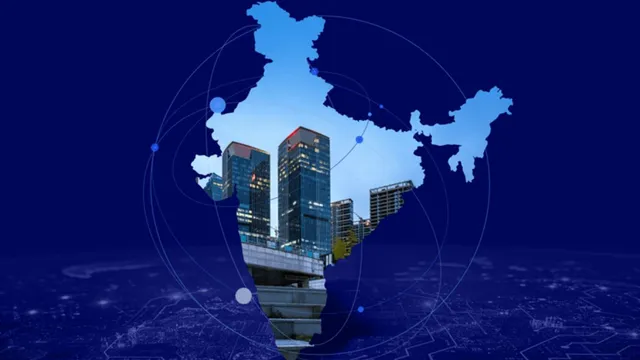- By Aditya Sinha
- Fri, 26 Sep 2025 02:30 PM (IST)
- Source:JND
President Trump’s plan to charge a USD 100,000 fee for every H-1B visa, almost the same as the typical annual salary of such workers (USD 120,000), makes it far harder for companies to hire Indians, who received nearly 70 per cent of all H-1B visas in 2024. Research shows what happens when firms can’t get H1B visas: a Management Science study found that each visa not issued leads to about 0.42 jobs being created overseas, and for most global companies, the shift is almost one-for-one (0.93).
Many of these jobs are high-value R&D roles, not just routine work. The natural destination is India, which already hosts one of the highest Global Capability Centres (GCCs) in the world. In effect, while Trump’s move raises barriers for Indians going to the US, it could actually give a big boost to India’s GCC ecosystem, keeping talent at home, attracting investment, and turning visa restrictions abroad into more jobs and innovation inside India.
A GCC is an office set up by a multinational company in another country to handle important parts of its business, like software development, research, data analysis, customer support, or finance. In India, these centres have grown far beyond call centres or back-office work of the 1990s. Today, they design new products, build artificial intelligence tools, manage global banking operations, and even carry out high-end research for their parent companies.
With over 1800 GCCs already in India, employing more than 2.16 million people, the country has become the world’s biggest hub for them. Companies choose India because of its large pool of skilled talent, lower costs, and the fact that they can avoid visa restrictions that make it harder to move workers abroad. For global firms, an Indian GCC is now less about saving money and more about tapping into India’s talent to create innovation for the whole world.
A recent PwC India report, "Catalysing Value Creation in Indian Global Capability Centres", shows how important GCCs have become for both global companies and India’s economy. Between FY20 and FY24, India’s GCCs grew the value they create for their parent companies by about 10–11 per cent each year on average, even though they usually handle only a small share of global work.
Another BCG report shows that India is not only the largest hub for Global Capability Centres (GCCs) but also one of the most balanced in terms of performance. 30 per cent of Indian GCCs are mature performers, while only 6 per cent lag behind, a much lower share of underperformance than in most other countries.
What makes this significant is the range of areas Indian GCCs are now driving. Indian GCCs are expanding into advanced fields like artificial intelligence (AI/ML), cloud computing, cybersecurity, data analytics, and user experience design (UI/UX). At the same time, they remain deeply involved in risk and compliance, supply chain management, customer service delivery, and digital transformation of operations. While AI and GenAI are still at an early stage of adoption, Indian GCCs are steadily moving from cost-saving and delivery roles to becoming innovation hubs that help global companies compete and grow.
The union government is further supporting the sprouting of GCCs. Finance Minister Nirmala Sitharaman, speaking at the CII GCC Summit in Andhra Pradesh last week, underlined the Centre’s commitment to work closely with states to make India the most attractive hub for GCCs. She stressed that while metros like Bengaluru, Hyderabad, and Gurgaon dominate today, the next wave of GCC growth must come from Tier-2 and Tier-3 cities, backed by strong infrastructure, digital connectivity, and skilling initiatives.
Highlighting the government's capital expenditure push, from 1.7 per cent of GDP in FY14 to 3.2 per cent in FY25, she noted that investments in airports, railways, metros, ports, and highways are already expanding the ecosystem that global firms need.
CII recently suggested a set of steps to accelerate the growth of Global Capability Centres (GCCs) in India. These include creating a National GCC Council to coordinate between the Centre, states, and global investors; setting up Digital Economic Zones (DEZs) with world-class plug-and-play infrastructure for advanced sectors like AI, space technology, and quantum analytics; and strengthening industry–academia partnerships through Centres of Excellence in areas such as cybersecurity, engineering R&D, and product innovation.
To sustain momentum and expand beyond metros, the GCC ecosystem needs further strengthening. A first step is to create single-window clearance systems dedicated to GCCs, so that global firms can obtain land, utility, data centre, and compliance approvals quickly and predictably.
Second, equally important is the design of targeted incentives for high-value work, encouraging GCCs to move up the value chain into advanced functions such as R&D, AI/ML, product design, and cybersecurity, rather than remaining limited to delivery and support.
Third, India must broaden the physical and digital foundations of the ecosystem. This means investing in Tier-2 and Tier-3 city infrastructure, from high-speed broadband and data centres to modern office space and reliable urban transport.
Fourth, it also requires tackling the skills gap by launching large-scale reskilling and certification programmes in future-oriented domains, anchored in industry-academia partnerships. Finally, to ensure balanced and inclusive growth, state-level GCC policies need to complement the national framework, offering locally tailored incentives such as land and power subsidies and focused skilling programmes.
Investing in the GCC story is especially important right now, as it has the potential to be a crucial driver of India's job growth in the coming years. With the right policies and ecosystem in place, GCCs could generate over 25 million jobs by the end of the decade, making them one of the most significant engines of employment and innovation for the country's future.
(Disclaimer: The author is a public policy analyst. Views are personal.)

